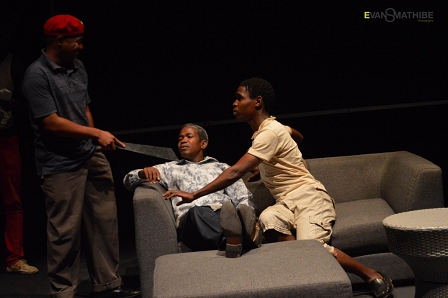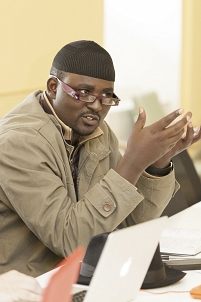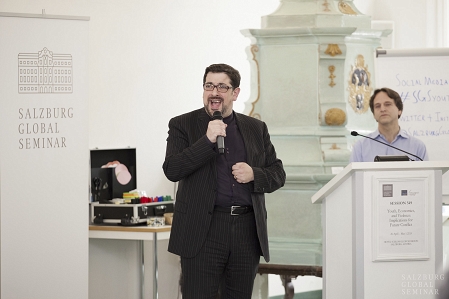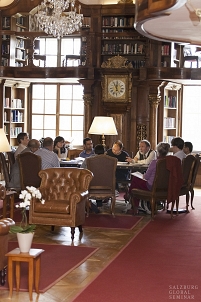Erstellt am: 20. 6. 2015 - 06:02 Uhr
There is no “Other” there is just “Us”
Tackling extremism
A Saturday Reality Check Special - from 12 to 1 midday and 7 days on demand.
"Our youth are in crisis primarily because they’ve been robbed of their dignity and robbed of their identity", says Warren Nebe, who runs an arts project in his native South Africa.
The scheme, called Drama For Life, is aimed at restoring some of that identity and some of that pride: "Violence really emerges from a space of dehumanisation."
Nebe's project consists of telling original human stories - expressing the stories of a still divided and unequal South African society by funding and staging original theatre performances. Expressing difficulties doesn’t make them disappear but it provides the writers, the actors and the audience a vent and creates a platform for dialogue.
And dialogue is the best tool against extremism.

DramaForLife
Walter Nebe was just one of the activists and thinkers who gathered this summer at a Salzburg Global Seminar in Schloss Leopoldskron for a brain-storming session on solutions to tackling violence extremism among young people across the globe. This Saturday’s Reality Check - 20th June at 12 noon - will feature voices from that melting-pot of ideas.

Salzburg Global Seminar
Inclusion Not Exclusion
For example Ahmed Hadji a Muslim social worker from Kampala, Uganda says the biggest danger is social exclusion.
Young people, he says, are often patronised, spoken down to or left out of the debate: "They want to see themselves as segment of society that matters. They want to be part of the societal efforts to build opportunities for themselves."
A Double Victim
He has a very personal reason for tackling the issues. Hadji was at the Kampala Rugby Club when extemists from Somalia-based al-Shabaab set off a deadly bomb while football fans watched the 2010 football World Cup on a big screen.
The next day, as he read of "Muslim terrorism", he felt he was a double victim; he had been caught up in an attack and then saw his community stigmatized. "I needed to make sure that there was a voice loud enough to counter the voice of destruction."
His quest is to reach out to impressionable young people before the radicals can groom them. It's a global phemonenon. "Maybe somebody brainwashed him, because he was not like that", said the father of 18-year-old Ali Kalantar, who left the suburban comfort of Coventry, UK, this spring to fight with IS. This week Talha Asmal, a 17-year-old from North England, described as a "gentle boy" by friends, blew himself and 11 Iraqis up after being groomed on the internet and ultimately used by IS as a suicide bomber.
In Africa too the internet is a battle ground and Ahmed Hadji's projects have included helping imams get internet-savvy so they can use their authority on internet forums and social media networks to emphasize the peaceful tolerant voice of Islam.
Islamophobia
Incidents of Islamic terror led to widespread Islamophobia in many countries. It’s a concern for Alexander Goldberg "There is a frightening rise of Islamophobia in Europe, the likes of which we have never seen. Young people from the Muslim community are scared. They are scared of being on the fringes of society."

Salzburg Global Seminar
Goldberg is not from the Muslim community. He's a Jewish chaplain who works across the cultural and religious divides in London trying to encourage dialogue.
Goldberg refuses to differentiate between anti-Semitism, Islamophobia or any other form of prejudice. One does not justify or excuse the other.
Of course he is concerned that in some neighbourhoods police have been posted outside Jewish schools due to credible threats from Islamic extremism but he says the answer cannot lie in any general vilification of Muslim communities:
"There is a frightening surge in Islamophobia in Europe the likes of which we have never seen and young people in the Muslim community are feeling scared. They feel alienated and on the fringes."
Talk About It!
But, he says, it is important to tackle bones of contention and not bury our heads in the sand. "I met some Jewish and Muslim liberals in London who must be sixty years old - they have been meeting, chatting and sharing food for ten years. The other week, they told me they had discussed Israel and the Palestinians for the first time. I thought 'Great, why didn’t you do this a decade ago.'"

Salzburg Global Seminar
There are legitimate concerns and grievances, not just the problems we see on the screens of cable network news but in every day local life too. But unless we talk about them and discuss them we won’t be able to see other points of view. Maybe we will never agree on certain issues, but we might tolerate these different opinions.
"Unless we have an open, diverse and pluralistic society in Europe, which recognises the equality of all its citizens, we risk Europe falling apart", says Goldberg.
There is no "Other" there is just "Us". We come in different colours, we speak different dialects and we worship different gods or maybe no gods at all. But the only way to move forward is to accept and tolerate those differences and to talk about them.


